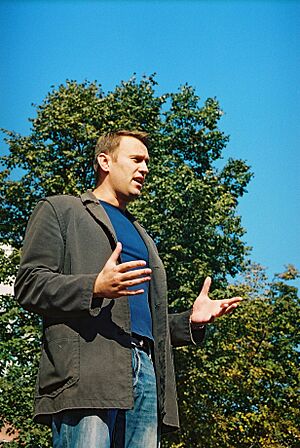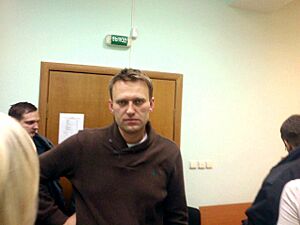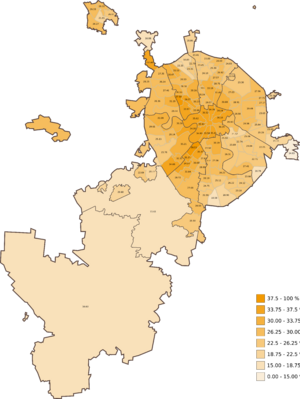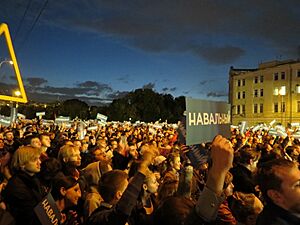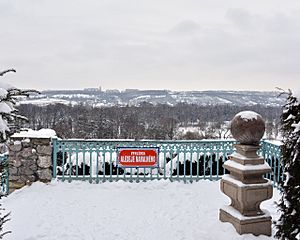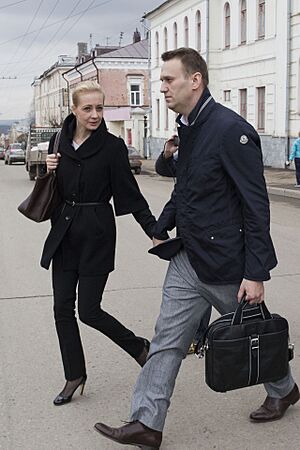Alexei Navalny facts for kids
Quick facts for kids
Alexei Navalny
|
|
|---|---|
|
Алексей Навальный
|
|
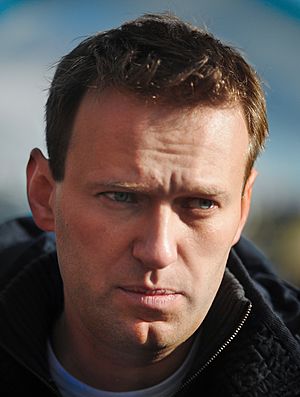
Navalny in 2011
|
|
| Leader of Russia of the Future | |
| In office 28 March 2019 – 17 January 2021 |
|
| Deputy | Leonid Volkov |
| Preceded by | Ivan Zhdanov |
| Succeeded by | Leonid Volkov (acting) |
| In office 17 November 2013 – 19 May 2018 |
|
| Preceded by | Office established |
| Succeeded by | Ivan Zhdanov |
| Chairman of the Session of the Russian Opposition Coordination Council | |
| In office 27 October – 24 November 2012 |
|
| Preceded by | Office established |
| Succeeded by | Garry Kasparov |
| Member of the Russian Opposition Coordination Council | |
| In office 22 October 2012 – 19 October 2013 |
|
| Freelance Advisor to the Governor of Kirov Oblast | |
| In office 4 May – 11 September 2009 |
|
| Governor | Nikita Belykh |
| Chief of Staff of the Yabloko Moscow Regional Branch | |
| In office 12 April 2004 – 22 February 2007 |
|
| Personal details | |
| Born | 4 June 1976 Butyn, Odintsovsky District, Moscow Oblast, Russian SFSR, USSR |
| Died | 16 February 2024 (aged 47) FKU IK-3, Kharp, Yamalo-Nenets Autonomous Okrug, Russia |
| Political party |
|
| Other political affiliations |
|
| Spouse |
Yulia Abrosimova
(m. 2000) |
| Children | 2 |
| Residence | Moscow |
| Education |
|
| Occupation |
|
| Known for | Anti-corruption activism |
| Awards |
|
| Signature |  |
| Website | , NavalnyLiveChannel |
| YouTube information | |
| Subscribers | 6.21 million (16 February 2024) |
| Total views | 1.49 billion (16 February 2024) |
Alexei Anatolievich Navalny (Russian: Алексей Анатольевич Навальный; 4 June 1976 – 16 February 2024) was a Russian political leader and activist. He was known for speaking out against corruption in Russia. He also organized protests and tried to run for public office.
Navalny was the leader of the Russia of the Future party. He also started the Anti-Corruption Foundation (FBK). He used his social media channels, like YouTube, to share information about corruption. His YouTube channel had over six million subscribers.
In August 2020, Navalny became very sick after being poisoned. He was flown to a hospital in Germany for treatment. He later said that Russian President Vladimir Putin was responsible for the poisoning. In January 2021, Navalny went back to Russia. He was immediately arrested and later sent to prison.
On 16 February 2024, the Russian prison service announced that Navalny had died in prison at age 47.
Contents
Early Life and Education
Alexei Navalny had both Russian and Ukrainian family roots. He grew up in a town called Obninsk, near Moscow. He spent his summers in Ukraine, learning to speak Ukrainian well. His parents owned a factory that made woven baskets.
Navalny finished high school in 1993. He then studied law and graduated in 1998 from the Peoples' Friendship University of Russia. He continued his studies in finance and graduated in 2001. In 2010, he received a special scholarship to study at Yale University in the United States.
Navalny worked as a lawyer for different companies in Russia starting in 1998. He became a full advocate (a type of lawyer) in 2009.
Political Activities
In 2000, Navalny joined a political party called Yabloko. He worked his way up in the party, becoming a leader of its Moscow branch. He stayed in this role until 2007.
In 2005, Navalny started a youth movement called "DA! – Democratic Alternative." This group was not linked to any political party. He helped organize political discussions that became popular. He also tried to host TV debates, but the show was stopped. Navalny believed that authorities did not want certain people to be on TV.
In 2007, Navalny left the Yabloko party. He also helped start a group called NAROD (The People). This group focused on issues like immigration.
In March 2012, after Vladimir Putin was elected president, Navalny helped lead a large protest in Moscow. He was briefly arrested after the protest. In May, he was arrested again after another protest and spent 15 days in jail. Human rights groups called him a "prisoner of conscience." In June, his home and office were searched by prosecutors.
Moscow Mayoral Election 2013
In 2013, the mayor of Moscow, Sergey Sobyanin, decided to hold an early election. On 3 June, Navalny announced he would run for mayor. To become a candidate, he needed support from many people and local officials. He was registered as one of six candidates.
On 18 July, Navalny was given a prison sentence for charges he said were politically motivated. He initially said he would drop out of the race. However, he was later released on bail while he appealed the decision. He then decided to stay in the election.
Navalny received 27% of the votes in the election. The winner, Sobyanin, received 51%. Navalny said the election results were not fair. He tried to challenge the results in court, but the courts upheld the election.
Presidential Election 2018
Navalny announced in December 2016 that he wanted to run for president in 2018. However, a court ruling from 2013 was brought up again. This ruling could stop him from officially becoming a candidate. Navalny said he would fight the ruling and continue his campaign.
Many people saw Navalny as the strongest challenger to Vladimir Putin. He organized many protests against corruption across Russia in March 2017. People in 95 Russian cities and four cities abroad joined these protests.
In April 2017, Navalny was attacked outside his office. Someone sprayed a green liquid into his face. This liquid seemed to be mixed with a harmful chemical. It caused a chemical burn to his right eye, and he lost much of his sight in that eye. Navalny believed the government was behind the attack.
In December 2017, Russia's election commission stopped Navalny from running for president. They said it was because of his earlier conviction. The European Union expressed serious concerns about this decision. Navalny then called for people to boycott the 2018 presidential election. He said that millions of Russians were being denied their right to vote. His appeals to the Supreme Court were rejected.
2020 Constitutional Changes
Navalny spoke out against the vote on new constitutional changes in July 2020. He called it a "coup" and a "violation of the constitution." He believed these changes would allow President Putin to stay in power for life. After the vote, Navalny said the results were a "big lie." The changes included an amendment that could allow Putin to serve two more terms as president.
Poisoning and Recovery
On 20 August 2020, Navalny became very ill during a flight from Tomsk to Moscow. The plane made an emergency landing in Omsk, and he was taken to the hospital. He was in a coma and needed a breathing machine. His team suspected something was put in his drink.
A plane from Germany took Navalny to a hospital in Berlin for treatment. On 24 August, doctors in Germany confirmed that he had been poisoned. On 2 September, the German government announced that Navalny was poisoned with a Novichok nerve agent. This is a very dangerous type of poison.
On 7 September, doctors announced that Navalny was out of his coma. He was discharged from the hospital on 23 September. His team later found traces of the nerve agent on a water bottle from his hotel room in Tomsk. This suggested he might have been poisoned before leaving the hotel.
An investigation in December 2020 suggested that agents from Russia's security service (FSB) were involved in the poisoning. Navalny later released a video where he pretended to be a security official. In the call, he learned that the poison might have been placed on his clothing, specifically his underwear. He was told he would have died if the plane hadn't made an emergency landing and if he hadn't received quick medical help.
Many countries, including the European Union, the United Kingdom, and the United States, placed sanctions on Russian officials because of the poisoning.
Return to Russia, Imprisonment, and Death
On 17 January 2021, Navalny flew back to Russia from Germany. He was immediately arrested at passport control in Moscow. Russian authorities said he had broken the rules of his probation by leaving the country. Navalny had received a suspended sentence in 2014 for charges he called politically motivated.
On 2 February 2021, a Moscow court changed Navalny's suspended sentence to a prison sentence. This meant he would spend over two and a half years in a labor colony. Many countries, including the United States and Germany, criticized this decision. Protests happened in many Russian cities, but they were met with strong police action.
The European Court of Human Rights asked Russia to release Navalny right away in February 2021. They said there was a risk to his life. However, Russian officials said they would not follow this decision.
On 28 February 2021, Navalny arrived at a prison in the Vladimir region. In early March, the European Union and the United States placed more sanctions on Russian officials because of Navalny's poisoning and imprisonment.
In April 2021, it was reported that Navalny needed urgent medical care. His doctors said he was at risk of heart or kidney failure. They asked prison officials to let them see him, saying he could "die any minute." Test results showed high levels of potassium in his blood, which can be very dangerous. Many politicians and celebrities called for him to receive proper medical treatment. U.S. President Joe Biden called his treatment "totally unfair."
On 19 April 2021, Navalny was moved from prison to a hospital for prisoners. In June 2022, he was moved to a high-security prison.
On 4 August 2023, Navalny received an additional 19-year prison sentence. This was for charges including encouraging extremist activity and "rehabilitating Nazi ideology." His trial was held in private.
On 16 February 2024, the Russian prison service announced that Alexei Navalny had died in prison.
Political Views
Social Issues
In 2017, Navalny's team stated that they supported the idea of legalizing same-sex marriage.
Foreign Policy
Navalny believed that Russia should have a say in the affairs of its neighboring countries that were once part of the Soviet Union. He supported the expansion of the Eurasian Economic Union. In 2008, he also called for Russia to support Abkhazia and South Ossetia after a conflict with Georgia.
In June 2020, he showed support for the Black Lives Matter protests against racism.
Syria
In 2016, Navalny spoke against Russia's involvement in the Syrian civil war. He believed that Russia should focus on its own problems at home instead of getting involved in foreign wars.
Awards and Recognition
Navalny received several awards and honors for his work.
- In 2009, he was named "Person of the Year" by a Russian business newspaper.
- In 2010, he received an award for protecting the rights of minority shareholders.
- He was a "World Fellow" at Yale University in 2010, a program for global leaders.
- Foreign Policy magazine named him one of the "Top 100 Global Thinkers" in 2011 and 2012 for his work on government transparency.
- Time magazine listed him as one of the "100 most influential people" in the world in 2012 and again in 2021.
- In 2015, he received the "Prize of the Platform of European Memory and Conscience."
- In 2017 and 2019, he was named "Politician of the Year" by Vedomosti.
- He was nominated for the 2021 Nobel Peace Prize by members of the Norwegian parliament.
- In 2021, he received the Boris Nemtsov Prize for Courage.
- A scenic viewpoint in Prague was named after Alexei Navalny in 2021.
- In September 2021, he received the Knight of Freedom Award.
- In October 2021, he was awarded the Sakharov Prize, a top human rights prize from the European Parliament. He also received a German media award.
Family Life
Alexei Navalny was married to Yulia Navalnaya. They had two children, a daughter named Daria and a son named Zakhar.
See Also
 In Spanish: Alekséi Navalni para niños
In Spanish: Alekséi Navalni para niños


